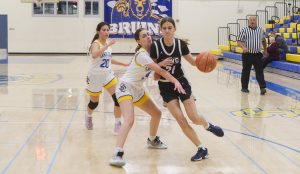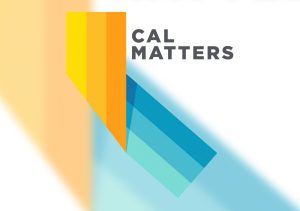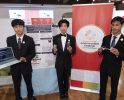Some of Santa Clara native Teresa Debbage’s most cherished childhood memories were working on STEM (Science, Technology, Engineering and Math) projects with her father. In particular, Debbage recalled designing a solar powered Barbie car with her father when she was 10 years old. Today Debbage shares her passion for exploring how things work as the STEM Program Coordinator and Teacher for Bracher Elementary School’s STEM Program, a free class for second to fifth graders that meets once a week after school.
“The funds for the after school STEM Program are paid for out of Bracher Elementary School’s budget and in addition to that, the Bracher PTA also donates $100 to $200 annually to the program,” said Debbage, a former parent at Bracher Elementary School. “Five years ago, when my daughter was in second grade, I talked with Wayne Leach, the principal, and told him about my interest in starting an after school science program. The first year it ran completely as a volunteer program and I had three or four others really involved parents helping me. This program is in its sixth year now. Right now, the after school STEM Program has 78 students [split up into a number of sessions].”
On Nov. 8, students in the STEM Program designed and constructed egg carriers intended to prevent a raw egg contained inside from cracking during a 10 to 15 foot drop. On the board, Debbage jotted down notes on scientific concepts about momentum, air resistance, gravity, kinetic energy and potential energy. Set on a table were an assortment of materials, such as pieces of cardboard, cups, plastic bottles, tissue paper, cotton balls and socks. Students worked in teams to design and construct egg carriers with the given materials. At this meeting, Debbage test-dropped an egg carrier a grandparent volunteer made. At another meeting, the students would test their own egg carriers.
“Kids naturally learn by doing things,” Debbage said. “This program gives them the opportunity to touch, feel and experiment with concepts and ideas that they otherwise weren’t getting exposed to. I don’t expect students coming in to have all the answers. It’s a space for discovery and creativity.”
Volunteering at the Nov. 8 meeting was Grace Goodson, 12, an alumna of the program who now attends middle school.
“I was in this program when I was in third grade at Bracher,” Goodson said. “I think the egg drop that we’re doing was my favorite activity because you and your group get to do all the work as opposed to the teacher showing you what to do. When I was here, I had a lot of questions about STEM. Now that I’m a volunteer, I know how to answer those questions for kids who have questions. A STEM field might be a career option for me.”
Debbage and other parents also work with teachers to integrate STEM into the classroom curriculum.
“The teachers have their own curriculum; when possible, we will integrate the STEM hands on approach with what the students are already studying in the classroom,” Debbage said.












0 comments